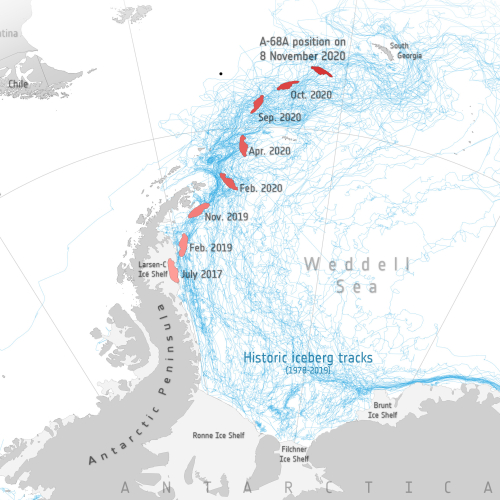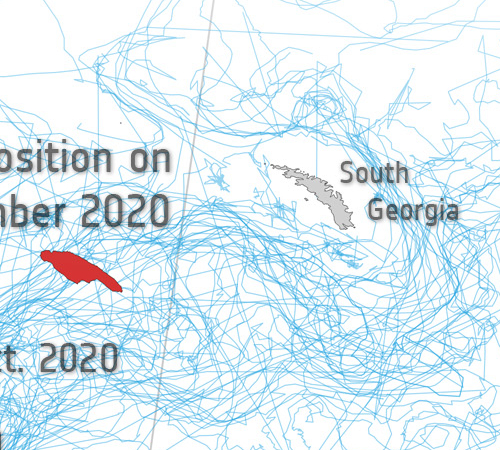Giant iceberg heading to possible collision with South Georgia Island


The largest section of a huge iceberg that broke off from Antarctica’s Larson ice shelf in 2017 is now headed directly for a collision with remote South Georgia Island.
The first image to the right shows the iceberg’s movement since 2017. The second zooms in to show that the iceberg and island are almost the exact same size, 100 miles long.
South Georgia Island, 1,000 miles east of South America, has no permanent human inhabitants, though explorers, scientists, and mountain climbers do go there periodically. Instead, it is a wildlife preserve:
Around five million seals call the islands home, as well as 65 million birds of 30 different species. Migrating whales and various fish species populate the surrounding waters and there is a large penguin population.
The first link above, from the European Space Agency (ESA), typically shivers with the modern mindless fear that seems to permeate everything our culture considers:
About the same size as the South Atlantic island, it could ground in the shallow waters offshore and cause real problems for the island wildlife and seafloor-dwelling life. Penguins and seals need access to the sea to feed so the iceberg could easily block their foraging routes and life on the seafloor could be crushed if the berg grounds. The fear is that if the berg does anchor against the South Georgia coast, it could remain there for up to 10 years. When the A38 grounded here in 2004, many dead penguin chicks and seal pups were found along the shoreline.
All maybe true, but then, the arrival of icebergs this large to South Georgia Island while likely rare is also quite normal. The sea life there has had to adapt to these events, or else it would not have survived to today.
Also, note the blue lines. Those are the tracks of past icebergs as recorded from orbit. Not only is it common for icebergs to be aimed at South Georgia Island, the currents appear to guide them around the island once they get close. While this new berg is so huge it might plow into the island anyway, the data here suggests it will not.
Regardless, this somewhat rare event provides scientists a opportunity to learn something about the survival of species in hostile environments. We can’t prevent such things, but we can learn their consequences as well as how life adapts under such conditions.
On Christmas Eve 1968 three Americans became the first humans to visit another world. What they did to celebrate was unexpected and profound, and will be remembered throughout all human history. Genesis: the Story of Apollo 8, Robert Zimmerman's classic history of humanity's first journey to another world, tells that story, and it is now available as both an ebook and an audiobook, both with a foreword by Valerie Anders and a new introduction by Robert Zimmerman.
The print edition can be purchased at Amazon or from any other book seller. If you want an autographed copy the price is $60 for the hardback and $45 for the paperback, plus $8 shipping for each. Go here for purchasing details. The ebook is available everywhere for $5.99 (before discount) at amazon, or direct from my ebook publisher, ebookit. If you buy it from ebookit you don't support the big tech companies and the author gets a bigger cut much sooner.
The audiobook is also available at all these vendors, and is also free with a 30-day trial membership to Audible.
"Not simply about one mission, [Genesis] is also the history of America's quest for the moon... Zimmerman has done a masterful job of tying disparate events together into a solid account of one of America's greatest human triumphs."--San Antonio Express-News


The largest section of a huge iceberg that broke off from Antarctica’s Larson ice shelf in 2017 is now headed directly for a collision with remote South Georgia Island.
The first image to the right shows the iceberg’s movement since 2017. The second zooms in to show that the iceberg and island are almost the exact same size, 100 miles long.
South Georgia Island, 1,000 miles east of South America, has no permanent human inhabitants, though explorers, scientists, and mountain climbers do go there periodically. Instead, it is a wildlife preserve:
Around five million seals call the islands home, as well as 65 million birds of 30 different species. Migrating whales and various fish species populate the surrounding waters and there is a large penguin population.
The first link above, from the European Space Agency (ESA), typically shivers with the modern mindless fear that seems to permeate everything our culture considers:
About the same size as the South Atlantic island, it could ground in the shallow waters offshore and cause real problems for the island wildlife and seafloor-dwelling life. Penguins and seals need access to the sea to feed so the iceberg could easily block their foraging routes and life on the seafloor could be crushed if the berg grounds. The fear is that if the berg does anchor against the South Georgia coast, it could remain there for up to 10 years. When the A38 grounded here in 2004, many dead penguin chicks and seal pups were found along the shoreline.
All maybe true, but then, the arrival of icebergs this large to South Georgia Island while likely rare is also quite normal. The sea life there has had to adapt to these events, or else it would not have survived to today.
Also, note the blue lines. Those are the tracks of past icebergs as recorded from orbit. Not only is it common for icebergs to be aimed at South Georgia Island, the currents appear to guide them around the island once they get close. While this new berg is so huge it might plow into the island anyway, the data here suggests it will not.
Regardless, this somewhat rare event provides scientists a opportunity to learn something about the survival of species in hostile environments. We can’t prevent such things, but we can learn their consequences as well as how life adapts under such conditions.
On Christmas Eve 1968 three Americans became the first humans to visit another world. What they did to celebrate was unexpected and profound, and will be remembered throughout all human history. Genesis: the Story of Apollo 8, Robert Zimmerman's classic history of humanity's first journey to another world, tells that story, and it is now available as both an ebook and an audiobook, both with a foreword by Valerie Anders and a new introduction by Robert Zimmerman.
The print edition can be purchased at Amazon or from any other book seller. If you want an autographed copy the price is $60 for the hardback and $45 for the paperback, plus $8 shipping for each. Go here for purchasing details. The ebook is available everywhere for $5.99 (before discount) at amazon, or direct from my ebook publisher, ebookit. If you buy it from ebookit you don't support the big tech companies and the author gets a bigger cut much sooner.
The audiobook is also available at all these vendors, and is also free with a 30-day trial membership to Audible.
"Not simply about one mission, [Genesis] is also the history of America's quest for the moon... Zimmerman has done a masterful job of tying disparate events together into a solid account of one of America's greatest human triumphs."--San Antonio Express-News


Perhaps South Georgia Island is now at risk for capsizing, just like Guam. Somebody go warn Rep. Hank Johnson!
Perhaps South Georgia Island is now at risk for capsizing, just like Guam. Somebody go warn Rep. Hank Johnson!
I’ll bet he expects it to sink like the Titanic.
It looks like this happens quite frequently.
I bet the ecology of the area is well adapted to this happening.
But hey why not call it global warming even if its happened for as long as the island has been there.
When viewed 2-dimensionally the berg appears on a collision course with South Georgia, but we have to compare water depth with the depth of the iceberg to tell whether collision is even possible.
Perhaps the berg could ground several miles away (assuming the ocean is deep relatively close to the island; I haven’t looked into that). As it melts over the years, it could be pushed closer to the island.
But nature will adapt as it always does, promoting some species, harming others, and having no net effect on others.
But of course the mainstream science media only considers the harmful possibilities, and exaggerates them to the max.
What about the Rights of the ice?
(And as stupid as that sounds I have actually heard that exact argument from you know who and you know where)
It looks to me the berg has a clockwise rotation that may spike the northern tip into the island. Then currents may swing the berg to rotate counter clockwise and pivot the berg south, and away from the island’s south coast. I agree with Garry. Let’s put some Ragu sauce on the spaghetti tracks and see what happens. I don’t think my car idling in rush hour traffic gave birth to this berg.